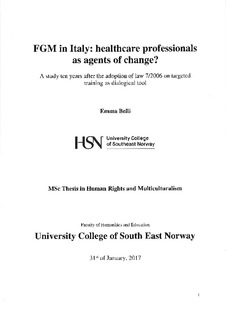| dc.description.abstract | Due to migration fluxes, modern societies are increasingly more characterized by a plurality of cultural groups, each one with its specific behavioral norms and cultural practices. Particularly, "female genital mutilation" (FGM) represents a challenge not only for multiculturalism but also for healthcare systems and for professionals working within: women with FGM have in fact specific medical and psychological needs that doctors, nurses, social assistants, etc., without specific training, will not be able to manage. In this regard, in 2006 Italy adopted and ad hoc law - law January 2006, n.7 - which -, in addition to prevent and prohibit the practice, entails guidelines addressing the training of professionals working in direct contact with immigrants from those countries where FGM i s traditionally performed. The purpose of this study is to verify whether educational activities have been implemented by Italian institutions and how this intervention has affected workers' knowledge in terms of FGM and their approach towards it, and, consequently, their role in launching a significant intercultural interaction with immigrants. To this end, a survey was conducted by means of a supervised self-completion questionnaire and the findings revealed the importance of targeted training in as much as a tool to establish intercultural dialogue with immigrant women and their communities. Significantly, this research conveys the need for an equal dialogical process between institutions and immigrant women, which are not anymore conceived ass passive barriers of traditions but as active protagonists of change | nb_NO |
